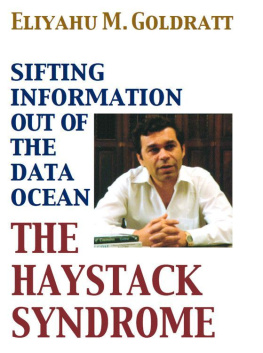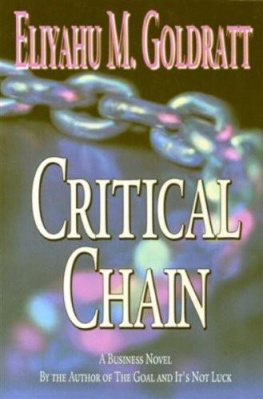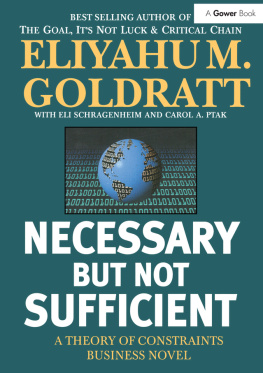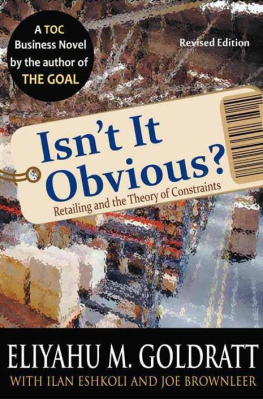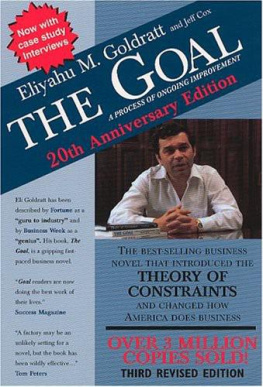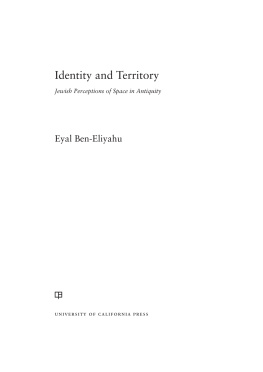THE
HAYSTACK
SYNDROME
Other North River Press Books by
Eliyahu M. Goldratt
The Goal
The Race (with Robert E. Fox)
Theory of Constraints
THE
HAYSTACK
SYNDROME
Sifting Information Out
of
The Data Ocean
Eliyahu M. Goldratt

Additional copies can be obtained from your local bookstore
or the publisher:
The North River Press
Publishing Corporation
P.O. Box 567
Great Barrington, MA 01230
(800) 486-2665 or (413) 528-0034
www.northriverpress.com
For more info on:
Eli Goldratt and his current projects
www.eligoldratt.com
Learning and implementing Goldratt's concepts (TOC)
www. GoldrattGroup. com
TOC materials and resources
www.TOC-Goldratt.com
Copyright 1990 Eliyahu M. Goldratt All rights reserved. No part of this book may be reproduced or utilized in any form or by any means, electronic or mechanical, including photocopying, recording, or any information storage and retrieval system, without permission in writing from the publisher. Manufactured in the United States of America ISBN: 0-88427-184-6
Table of Contents
THE
HAYSTACK
SYNDROME
PART ONE
FORMALIZING THE
DECISION PROCESS
Data, information and the decision
processhow they relate
We are drowned in oceans of data; nevertheless it seems as if we seldom have sufficient information. Do you agree? Does it bother you?If so, why don't we discuss itnot just idle discussion, crying on each other's shoulders, finding comfort in telling war stories. Let's discuss it more seriously, almost as if we pretend that "you and I can change the world." Let's actually attempt to find a practical solution to this horrendous problem, one that can really work.Where should we start?The obvious logical place would be to define precisely what we mean by the words data and information. What is the real distinction between them? This is the core of our complaint, isn't it? Are these words already defined? Maybe they are in dictionaries and some textbooks, but certainly not in practice.How many times have you seen a computer package offered under the title of "information system" that, after a casual examination, you immediately discovered was just a "data system"?!What is data?An address of a supplier is data. A purchase price of an item is data. Each detail of a product's design or the contents of a warehouse is also data. It seems as if every string of characters that describes something, anything, about our reality, is data. If this is the case, what is left to be called information?It looks as if the only way to answer this question is by refuting what we just postulated. The address of a supplier is data, but for the person who has to send a complaint letter, this address is definitely information. You might call the content of a warehouse data, but if you are looking to find whether or not an urgent client order can be immediately fulfilled, then it is information. The same string of characters that we refer to as data, might be called, under some circumstances, information. It appears that information is in the eyes of the beholder.Are we going in circles? Not necessarily so. Intuitively we understand information to be that portion of the data which impacts our actions, or if missing or not available will impact our actions. For different people or even for the same person at different times, the same string of characters might be data or information.We almost cannot escape the realization that the distinction between data and information does not lie in the content of a given string of characters. It lies more in its relationship to the required decision. If we don't know in advance what type of decision we are going to make, if we don't know in advance what exactly we will need, then every piece of data might at some time be considered information. Is it any wonder it is so difficult to distinguish a data bank from an information system?Can we, in our changing world, ever be in a position where we can distinguish, a priori, what is information? Is it at all possible to design something that we can wholeheartedly call an information system, especially when that system is not intended to be used for just one type of decision, for just one management function?We would like to have a system that will supply information to all the managers in an organization, for all types of decisions. From what we've said so far, it looks as if, at any given point in time, most of the content of such a system will actually be just data. So what?! If it will supply the information, does it really matter?!This is exactly the line of reasoning that has led us into the current systems. You see, the next natural step will be to start asking ourselves what type of possible questions we might face in the future. Not just we, but every function in the organization. Then, we happily jump into the next steptrying to define which pieces of data/information will be required. From there it is just a small step until we're totally immersed in the effort of defining the appropriate input formats, file layouts, query procedures, etc.... The road to the mammoth task of collecting and maintaining oceans of data is now wide open. The same trend also impacts the format of the output reports. They will be voluminous, trying to cover every possible question. Yes, in the last few years personal computers and online query capabilities have, to some extent, eliminated this phenomenon, but not the underlying thinking that led to it.In Israel, there is a legend that I cannot testify is true, but I would not be surprised if such a case really happened. Ten years ago, the only practical way to retrieve information from the computer was by printed reports. At that time, the central computer department of the Israeli army was considering the then new technology of the mammoth laser printer as an answer to their prayers. A captain in that department, probably very arrogant and also a little bit irresponsible, decided to address the same problem in quite an original way. Without any approval, he gave an instruction to stop printing, dispatching, and sending any report that contained more than 100 pages. At that time, when computer decentralization was just a thought, numerous copies of these reports were spread from the central site to numerous points in the army. The legend recounts that only one single complaint arrived from the receiving points. The person who complained was a guy whose job it was to neatly file the reports.Every manager in a large organization can very easily relate to this legend. If this particular story is a legend, many, many similar stories are definitely reality. Besides, what was our original complaint? We are drowning in oceans of data. The situation today is so bad that in public appearances, whenever I raise the suggestion of connecting the printers directly to the shredders, the audience responds with laughter and cheers. Somewhere along the line we have taken a wrong turn. Somewhere along the line there must be a logical flaw. Information systems may not preclude the necessity for data banks, but certainly information systems must be totally different entities. If they are to be effective, they cannot be identical to our current data banks.Let's go back to the point where the distinction between data and information was stated. We have attempted to define information as the data required to reach the decision. This attempt didn't carry us too far, but nevertheless, intuitively we feel that information can be defined only within the framework of how we make decisions. Maybe we should define information not as "the data required to answer a question" but as "the answer to the question asked."This is not just a semantic difference. View it for a minute or two, and you too will probably feel as uneasy as I do. You see, the minute that we define information as the answer to the question asked, it means that information is not input to the decision process, it is the output of the decision process. Accepting this definition implies that the decision process itself must be imbedded in an information system. This will require the frightening task of achieving a very precise formalization of the decision process. In our case it definitely means to open a new Pandora's Boxin industry today the decision process itself is changing.The eighties are viewed, by more and more professionals, as the decade in which a second industrial revolution occurreda revolution in the way that we regard the essence of managing our business, a revolution that impacts the basic procedures by which managers make decisions. Any logical discussion of the composition and structure of information systems must be done within the framework of the decision process. Thus, we cannot escape from the necessity of analyzing the new management philosophy that has started to emerge.At first sight, it might look like a huge deviation. We would like our discussion to lead to information systems, and suddenly we may have to spend considerable time analyzing management philosophies? But it is unavoidable as long as we want to explore the possibility of finding a robust method that will lead to the creation of satisfactory information systems. Besides, maybe the simplicity that characterizes these new movements will lead to new, much simpler, and more powerful solutions for our subject as well.
Next page

